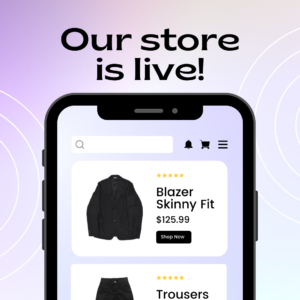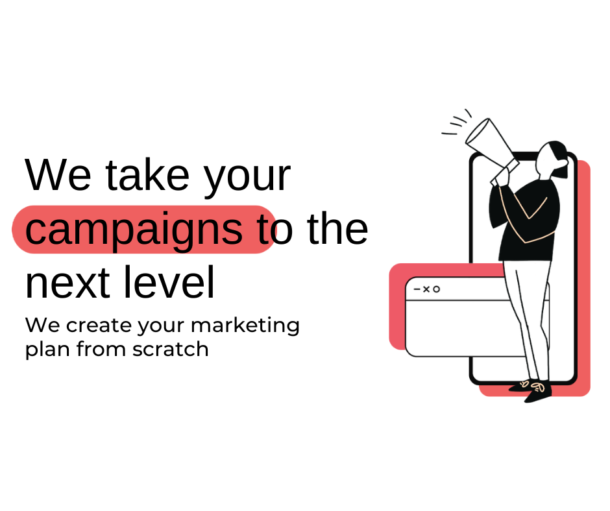Well done your Shopify Store is Live, But what about the sales ?
The heavy lifting is now over! Or is it?
Your Shopify store is now live, and your product listings are beautifully presented to entice customers. But what’s next? How will you drive traffic and secure that all-important first sale? If you don’t have a plan yet, don’t fret! We’ve compiled the top industry best practices, drawing on our expertise as digital marketing professionals and Shopify partners, to support new store owners like you.
Optimising Your Shopify Store for SEO
 Search engine optimisation (SEO) is a fundamental aspect of driving organic traffic to your Shopify store. By implementing targeted SEO strategies, you can enhance your store’s visibility on search engines like Google, ultimately boosting sales and customer engagement. Here are some essential steps to optimize your Shopify store for SEO.
Search engine optimisation (SEO) is a fundamental aspect of driving organic traffic to your Shopify store. By implementing targeted SEO strategies, you can enhance your store’s visibility on search engines like Google, ultimately boosting sales and customer engagement. Here are some essential steps to optimize your Shopify store for SEO.
First and foremost, conduct thorough keyword research. Identify the terms and phrases potential customers are using to search for products similar to yours. Tools like Google Keyword Planner and Ahrefs can assist in uncovering valuable keywords. Once you have a list of relevant keywords, integrate them naturally into your product titles, descriptions, and content without overstuffing. For instance, if you are targeting customers in Australia and New Zealand, consider including location-specific keywords to attract a local audience.
Optimising product titles and descriptions is critical. Ensure that each product title is clear, concise, and includes a primary keyword. Product descriptions should be informative and engaging, highlighting the features and benefits of the product while naturally incorporating relevant keywords. Avoid duplicate content and ensure that each product description is unique to improve SEO for Shopify.
Improving site speed is another crucial factor. A fast-loading site not only enhances user experience but also positively impacts your search engine rankings. Compress images, leverage browser caching, and utilize a Content Delivery Network (CDN) to reduce load times. Shopify offers various apps and tools to help optimize site speed.
Creating SEO-friendly URLs is also essential. A clean, readable URL structure that includes relevant keywords can improve your search engine rankings. Avoid using long, complicated URLs with unnecessary characters. Instead, aim for short, descriptive URLs that accurately reflect the content of the page.
Meta descriptions and alt text for images are often overlooked but play a significant role in SEO. Craft compelling meta descriptions for each page, incorporating primary keywords to entice users to click on your link. For images, use descriptive alt text that includes relevant keywords to help search engines understand the content and context of the images on your site.
By implementing these SEO strategies, you can significantly enhance your Shopify store’s visibility on search engines, driving more organic traffic and increasing your chances of converting visitors into customers.
Leveraging Social Media Marketing
Social media marketing is an indispensable strategy for increasing visibility and driving traffic to your Shopify store. By effectively utilizing platforms such as Instagram, Facebook, Pinterest, and Twitter, you can engage with potential customers and promote your products to a wider audience. Each platform has unique features and demographics, making it essential to tailor your approach to fit the specific nuances of each.
Creating engaging content is the cornerstone of successful social media marketing. High-quality visuals, compelling captions, and consistent posting schedules can captivate your audience and encourage them to interact with your brand. For instance, Instagram is highly visual, making it ideal for showcasing product images and videos. Meanwhile, Facebook allows for longer posts and a variety of content types, including live videos and polls, which can foster deeper engagement with your audience.
Running targeted ad campaigns can further amplify your reach. Platforms like Facebook and Instagram offer sophisticated targeting options that enable you to reach specific demographics based on interests, behaviors, and location. For example, if your Shopify store caters to customers in Australia and New Zealand, you can create ad campaigns specifically targeting users in these regions, thereby optimizing your advertising spend and increasing conversion rates.
Collaborating with influencers can also provide a significant boost to your social media efforts. Influencers have established credibility and large followings that can lend authenticity to your brand and expand its reach. Partnering with influencers who align with your brand values and have a strong presence in Australia and New Zealand can be particularly beneficial in tapping into these markets.
Utilizing user-generated content is another effective strategy. Encouraging customers to share their experiences with your products and using these posts in your marketing can build trust and foster a sense of community. User-generated content serves as social proof, demonstrating the value of your products through real-life applications.
By building a robust social media presence and leveraging these strategies, you can attract a wider audience to your Shopify store and convert followers into loyal customers. Consistent engagement and strategic content creation are key to maximizing the potential of social media marketing.
Implementing Email Marketing Campaigns
Email marketing continues to be a cornerstone strategy for converting visitors into loyal customers on your Shopify store. Building a robust email list should be your first step. Utilize sign-up forms on your website, offering incentives such as discounts or exclusive content to encourage visitors to subscribe. Additionally, consider integrating pop-ups and exit-intent overlays to capture leads before they leave your site.
Creating compelling email content is crucial for engagement and conversion. Focus on crafting subject lines that grab attention and use clear, persuasive language in your messages. High-quality visuals can also enhance the appeal. Your emails should offer value—whether through informative content, special promotions, or personalized recommendations based on customer behavior.
Automated email campaigns can streamline your marketing efforts significantly. Set up welcome series for new subscribers, abandoned cart reminders, and post-purchase follow-ups. These automated emails can help nurture leads, retain customers, and encourage repeat purchases. Tools like Shopify Email and other third-party apps make setting up these automations straightforward.
Segmentation is another powerful tactic in email marketing. By segmenting your email list based on factors such as purchase history, browsing behavior, and engagement levels, you can send more targeted and relevant content. This personalization can lead to higher open rates, click-through rates, and overall customer satisfaction.
Lastly, always measure the performance of your email campaigns using key metrics like open rates, click-through rates, and conversion rates. Continuous analysis will help you refine your strategies, ensuring your email marketing efforts are as effective as possible. In markets like Australia and New Zealand, where consumer preferences can vary, localized content and offers can make a significant difference.
Effective email marketing is not just about sending messages; it’s about building and nurturing relationships with your customers. When executed well, it can be a powerful tool for driving sales and fostering long-term loyalty to your Shopify store.
Analyzing and Improving Store Performance
Continuous improvement is pivotal in maintaining and elevating the success of your Shopify store. Leveraging analytics tools is essential for understanding and enhancing your store’s performance. By consistently tracking key metrics, you can gain insights into traffic sources, conversion rates, and customer behavior, which are critical for making informed decisions.
Begin by integrating tools such as Google Analytics with your Shopify store. This will enable you to monitor where your visitors are coming from, whether it’s organic search, paid ads, social media, or direct traffic. Understanding these sources allows you to allocate your marketing budget effectively, focusing on channels that bring the most traffic and conversions.
Conversion rate optimization (CRO) is another vital aspect. CRO involves analyzing how visitors interact with your store and identifying barriers that prevent them from converting into customers. Keeping an eye on conversion metrics will help you pinpoint issues in the shopping journey, from product page views to checkout completions. By making data-driven adjustments, such as simplifying navigation or improving product descriptions, you can enhance the overall shopping experience and boost your conversion rates.
Additionally, A/B testing is a powerful method to optimize various elements of your store and marketing campaigns. This involves creating two versions of a webpage or marketing material and comparing their performance to determine which one resonates better with your audience. Whether it’s testing different headlines, images, call-to-action buttons, or email subject lines, A/B testing provides valuable insights that can guide your optimization efforts.
Furthermore, customer behavior analysis is crucial for tailoring your store to meet shopper needs. Tools like heat maps and session recordings can reveal how customers navigate your site, which areas they engage with most, and where they drop off. By understanding these behaviors, you can make strategic adjustments to improve user experience and satisfaction.
By regularly analyzing data and making informed adjustments, your Shopify store in Australia or New Zealand can not only improve sales but also foster a loyal customer base. Investing time in continuous performance analysis ensures that your store remains competitive and responsive to market demands.
Need help with your SHopify Store?
Immersive Marketing: Your Experienced Shopify Partner
Immersive Marketing is your trusted Shopify Partner, dedicated to helping businesses scale to profitability in the APAC region and globally across the USA, UK, and Canada. With our proven expertise and tailored strategies, we empower Shopify store owners like you to achieve sustainable growth and success in competitive markets. Whether you’re looking to boost organic traffic through advanced SEO techniques or leverage targeted Google Ads campaigns, our team is committed to maximising your store’s visibility and driving sales. Partner with Immersive Marketing today and unlock your Shopify store’s full potential.


